Under Pressure: Inside the Merrimack Valley Gas Explosions
The inside story of death, survival, and the reckless gas company that set the Merrimack Valley on fire.
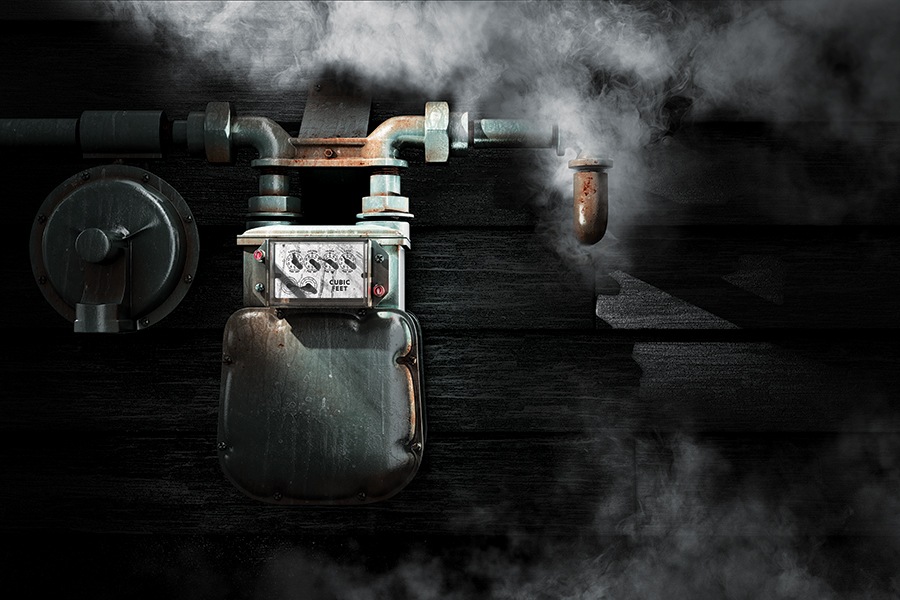
Illustration by Comrade
On the afternoon of September 13, 2018, Leonel Rondon’s father picked him up from school and proudly drove him to the Lawrence RMV. An hour later, the lanky 18-year-old with almond-shaped eyes and thick black hair was beaming as he held his driver’s license in his hand. He was one step closer to becoming the responsible man his immigrant parents wanted him to be. Miguel and his wife, Rosaly, had moved to the United States from the Dominican Republic during the 1990s, worked hard, and raised three kids. Today was another milestone, another American rite of passage. With his license, their oldest son could get a job, drive to church events, and shuttle around Rihanny, his sister’s toddler, whom he adored as if she were his own.
On the ride home, Leo spoke with his father in Spanish about the future and what might lay ahead: a new car, a high school degree, and maybe—just maybe—college.
Today, though, it was time to kick back and celebrate. Miguel dropped Leo off at his friends’ place a few blocks down the road in South Lawrence and waved goodbye. At 1,900 square feet, the Figueroas’ home was big by Lawrence standards, with a pool out back that made it a popular hangout spot. A couple of Leo’s buddies lived there with their mother, Omayra, and as soon as Leo pulled up, the entire Figueroa family spilled out of the house to congratulate the new driver.
Leo was eager to get back behind the wheel, so he and the two Figueroa brothers, plus their friend Christian Caraballo, piled into the family’s Toyota RAV4 parked in the driveway. Music from the car’s speakers wafted into the warm afternoon air as Leo gripped the wheel, plotting adventures with his boys. Omayra and her 21-year-old daughter, Shakira, went back inside to start cooking dinner.
Then out of nowhere came a deafening boom. In a heartbeat, the house that had stood on Chickering Road for the past 62 years was gone, the walls blown out and the gray roof reduced to a pile of smoking shards.
The force of the blast hurled Omayra more than a dozen feet. Landing under a heap of rubble, where her hallway once stood, the shocked mother began crawling toward what was left of her front door. She was all right. She was fine. It was a miracle. But then she heard Shakira’s cries for help. She couldn’t see anything in the smoke and darkness, but she frantically followed her daughter’s voice until she reached the spot where Shakira was buried beneath the wreckage. Omayra clawed through a tangle of drywall, two-by-fours, and wood flooring to uncover her daughter’s face. Omayra was no stranger to tragedy: Eight years earlier, Shakira’s twin brother had drowned while swimming in the Merrimack River. Now her daughter was buried alive in her own home, crying out that she couldn’t feel her legs.
Outside the home, the scene was even worse. The blast had propelled the house’s chimney into the driveway, where it landed on the RAV4, crushing it like a beer can. Trapped inside were the four young men. Leo, sitting in his newly earned spot at the wheel, was slowly suffocating under a ton of bricks.
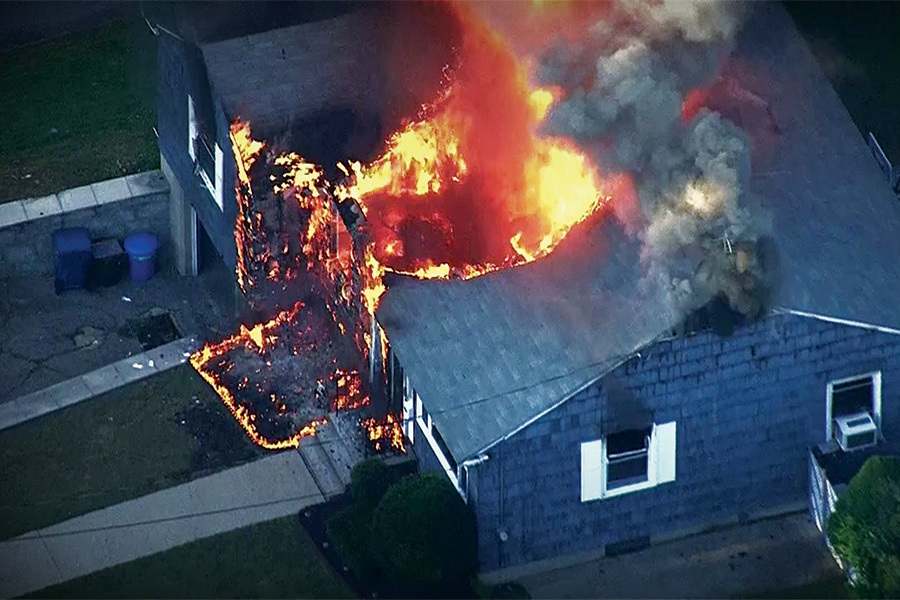
On September 13, 2018, explosions and house-fires rocked South Lawrence in the wake of a gas line failure. / Photo courtesy of WCVB NewsCenter 5
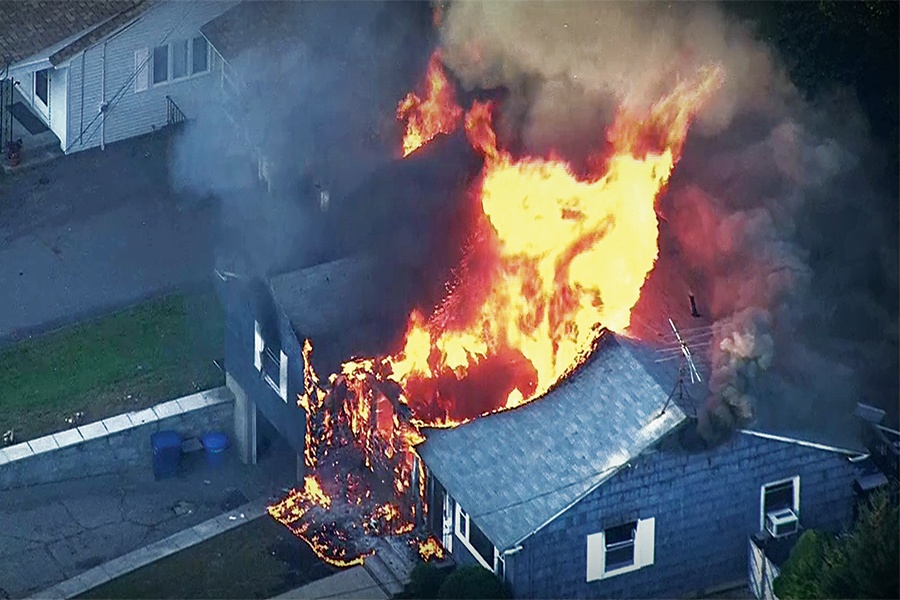
Photo courtesy of WCVB NewsCenter 5
Not far away, Lawrence Police Chief Roy Vasque was driving around the city alone in his patrol car when he heard about a house fire in South Lawrence. Nothing surprising there. It was an old city with old housing stock. Plenty of homes lacked smoke detectors. Fires were common. Buildings burned. Sometimes people died.
Fit and trim in his early fifties with a black circle beard, Vasque sped up, passing unwieldy Victorians clad in cheap aluminum siding, street after street of wooden triple-deckers packed with immigrant families, and heavily mortgaged postwar apartments—the typical streetscapes of the poorest city in Massachusetts. Heading to the fire, his phone rang: There was a report of an explosion on Chickering Road. Vasque turned on his siren and stepped on the gas.
Minutes later, halfway down the quiet suburban street with modest single-family homes and clipped lawns sporting ornaments swaying lazily in the wind, Vasque encountered a horrific scene. The gray roof of 35 Chickering sat on a pile of smoldering shards. Insulation, splinters, and plaster dust still swirled in the afternoon sunlight, creating a hazy halo. Chunks of debris had been hurled across the street into neighbors’ yards. It looked like a scene out of a war movie.
In a daze, bystanders were drawn toward the disaster. Vasque stepped out of his patrol car and ordered them back, then turned his attention toward the two panicking people in the driveway—Caraballo and Omayra. The man had managed to find a way out of the crumpled SUV and was trying to pull the three others out from under the fallen chimney, while the woman was frantic, saying something about her daughter. Vasque could hear muffled cries coming from the mass of smoking debris. He feared the worst and knew they needed to get the injured into an ambulance immediately.
Within moments, a rescue company truck pulled up and the crew began cutting away the RAV4 from the three young men. Another rescue crew broke down what was left of the front door of the home. Firefighters extricated Shakira from the rubble, revealing her severely injured legs. She and the young men from the car were loaded into the waiting ambulances, which sped off, sirens blaring, to Lawrence General Hospital.
But the tragedy was far from over. Vasque’s emergency radio was flooded with reports of fires all around the city. An overwhelming sense of crisis gripped him. Vasque knew something terrible was happening in Lawrence—but what?
Some 30 miles away, Lawrence Mayor Dan Rivera, broad and built like a former linebacker, was folded into a chair in a Boston classroom. He was in the middle of a days-long training course with his chief of staff, Eileen Bernal, when Bernal’s phone suddenly buzzed with a text from City Hall: “There have been multiple fires in Lawrence.” She showed it to Rivera. They looked at each other quizzically.
Then Rivera’s phone rang. Vasque’s number flashed on the screen. Stepping out of the classroom, Rivera answered.
“Hey, I don’t know what’s going on,” Vasque said. “There are multiple fires across the community, and we think it’s in Andover and North Andover, too.”
Vasque was a serious man. Still, what he was saying couldn’t be right. Rivera told his police chief not to joke around.
Vasque gravely responded, “I’ve never seen anything like this before in my life.”
Rivera told Bernal they needed to get back to Lawrence fast. They made their way to the Tremont Street garage where Rivera’s car was parked. Over the phone, he asked Vasque to tell him more. “Just get home,” Rivera remembers hearing from Vasque before losing cell service in the underground lot.
On the highway heading north out of Boston, Rivera fought late-summer traffic while trying to manage the developing crisis by phone. Explosions? Might have something to do with the water department, Rivera thought. After all, crews were always fixing the city’s ancient water infrastructure. Weeks earlier, a contractor for the water department had hit a gas line while fixing pipes. Rivera’s first call was to the city’s water-and-sewer commissioner, Brian Peña.
No, Peña said, it wasn’t a water thing.
Rivera’s mind turned next to gas, but calling the city’s provider, Columbia Gas, didn’t get him any answers. “I don’t know what you’re talking about,” the government relations guy said. “I’m in Boston.”
Then Rivera called Columbia Gas’s operations manager, Dana Argo. Rivera remembers the conversation going like this:
Argo: “Hey, what’s going on?”
Rivera: “I don’t know. You tell me what’s going on.”
Argo: “What are you talking about?”
Rivera: “We have multiple fires.”
Argo: “I don’t know what you’re talking about.”
Rivera: “You need to find out and call me back.”
Rivera says he then told Argo, “I want you to pick up the phone every time I call you, even if you don’t have anything to report to me. Don’t let me go to voicemail.”

Police Chief Roy Vasque faced the unimaginable challenge of having to evacuate the city as it burned. / Portrait by Ken Richardson
Around 4 p.m., and hundreds of miles away, workers at Columbia Gas’s central monitoring center had noticed a spike in Lawrence’s gas line. They didn’t have the necessary information to isolate the cause, but it didn’t much matter anyway—the station is in Ohio, and the company had no ability to shut off the flow of gas remotely. The best they could do was alert a few members of a local team about the pressure anomaly.
Meanwhile, back on I-93 north, Thursday-afternoon traffic was crawling. Mayor Rivera tried turning on his official yellow blinking lights, but no one budged. Then he tried driving on the shoulder next to the median, but debris in the road kept him from getting by. He pulled back into his lane and smoldered in his helplessness. By the time Rivera made it to the Lawrence exit, police were erecting blockades to keep people from entering the city. They waved him through. Rivera made his way past an armada of emergency vehicles and turned onto Chickering Road.
As soon as he saw what was left of the house, his attention focused like a laser.
Rivera had served as a military police officer in the U.S. Army in Iraq and Kuwait during Operations Desert Storm and Desert Shield. On Chickering Road, he spotted Vasque and immediately recognized the strange calm he’d experienced in combat zones—that thin, tenuous line that keeps trained officers eerily levelheaded when other people generally freak out.
With the overwhelming and unmistakable stench of gas in the air, Vasque looked at Rivera and began to wonder why only one house on the block had blown up. His mind raced as he tried to quell his panic that he, along with everyone else, was about to die right there in the driveway.
A little after 4 p.m., Fire Chief Brian Moriarty had just finished his shift and was settling in for a drink at a bar with friends when he received word of the fires consuming Lawrence. “The city’s burning,” Moriarty announced, excusing himself from his table and scrambling toward his car.
Within 20 minutes, Moriarty, who could pass for a Kennedy miles downstream of the family fortune, made his way to the site of one of the first explosions, on Springfield Street, to find thick, chalky smoke billowing from a multifamily home’s third-floor window. Firefighters were battling the blaze, but Moriarty knew the house was probably a goner. All the while, his radio buzzed with report after report of fires. Basements around the city were going up in flames. Moriarty immediately began tracking the fire reports and his assets; he knew his four pump-and-hose trucks, two ladder trucks, and one rescue truck couldn’t handle the massive number of calls flooding in. His own firehouse was in shambles—the concrete floor was so rotted that one of his guys had tripped over a hole and twisted his knee, which kept him on disability for several months. In other words, the fire chief needed all the help he could muster. In his sandpaper baritone, he instructed his dispatcher to pull every alarm.
As the FEMA-designated crisis coordinator, Moriarty set up a makeshift command center right there on the side of Springfield Street, with little more than a whiteboard he had pulled out of the back of his car. This was the kind of moment he had trained for, but hoped he’d never see.
Less than a mile away, one of his off-duty firefighters, Dave Amero, was mowing lawns in his Colonial Heights neighborhood, enjoying the beautiful day in shorts and a T-shirt, when his wife hurried out of their house with their goldendoodle to tell him that she smelled gas. He ran inside and was nearly knocked down by the stench. Must be the stove, he thought, and shut off the gas fitting there, telling his wife he’d deal with it later.
A few minutes passed before he heard her scream. He turned off his mower and ran back into the house again. His wife told him she heard a strange noise coming from the basement. Amero could hear it, too—a sinister hissing sound. Amero rushed downstairs and shut off the gas line to the boiler, but by that time, the whole house was full of the stuff. He knew that the gas-to-air mixture has to be just right for an explosion, between 5 and 15 percent. All that was needed was a spark. Amero ordered everyone—his wife, younger daughter, granddaughter, and the dog—to get out.
Standing in the driveway with his family, Amero started to call the fire company when he heard a massive blast. He looked up to see the house across the street exploding. He turned to his wife and daughter and saw the horror on their faces. “I don’t know what’s going on, but it’s not good,” he told them, ordering his family to head toward a big plaza with an old movie theater, a large open space away from houses. As he watched them go, his daughter shoeless, he heard a second explosion, this time on his left. He turned to see his neighbor’s house engulfed in flames. He called the fire alarm dispatcher to tell him that they had a working fire. Yeah, the dispatcher said, we have 10 of them in the city.
Amero was a seasoned firefighter but couldn’t fathom how there could be 10 working fires at once. But there was little time to think. Once the fire truck arrived on the scene, he grabbed a pipe wrench and began going from house to house shutting off gas meters. He ran down the middle of the street, trying to cut a wide berth from the homes, until he thought about the gas line running down the road right underneath him, and started running across the lawns.
He had good reason to be worried. When an engineer at the local Columbia Gas office got the call from Ohio, he dispatched three workers to drive around field-checking the 14 regulators scattered throughout the city. In the few hours it took them to accomplish that task, high-pressure gas had flowed into the pipes under South Lawrence’s streets, straight into its houses, businesses, and schools. The entire neighborhood in Lawrence was sitting over a gas system that was under extreme pressure. The whole place was ready to blow.
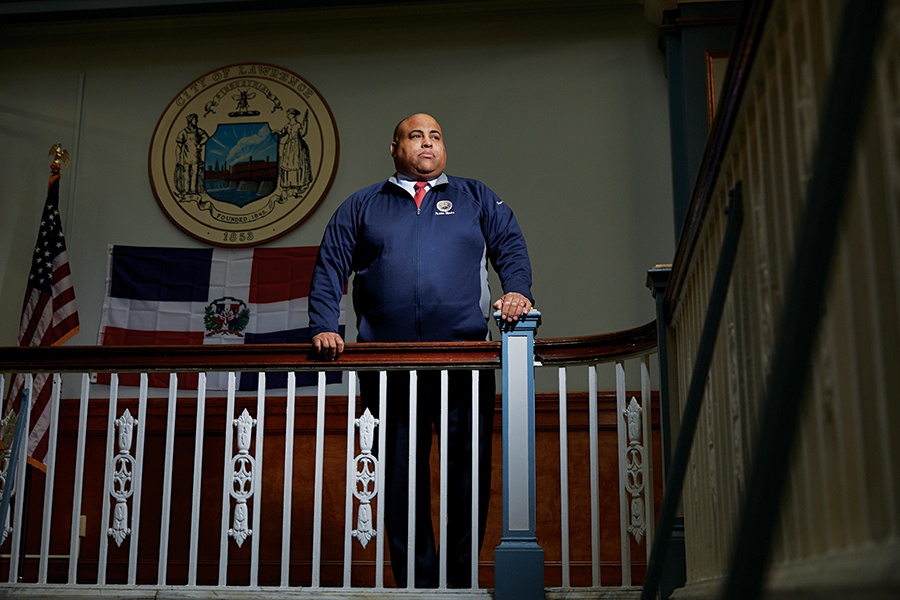
Lawrence Mayor Dan Rivera faced the unimaginable challenge of having to evacuate the city as it burned. / Portrait by Ken Richardson
Around 6 p.m. that night, two hours after the first alarm, Argo showed up at Lawrence’s command center—which had been moved from Moriarty’s tailgate whiteboard to the city’s emergency 1970s Winnebago. Argo told Mayor Rivera what everyone already suspected: For some reason, there was too much high-pressure gas in the system. He informed the mayor that all of South Lawrence had to be evacuated. Immediately. Rivera was incredulous. Were the thousands of inhabitants of South Lawrence all in danger? Rivera reluctantly pulled out his phone and fired off an official text to his entire constituency ordering them to leave their homes.
Police officers started walking door to door, urging residents to evacuate. Some refused to go. Some couldn’t speak English. Some, fearing deportation, didn’t answer. Some worried about looting and wanted to stay to protect their possessions. People with serious healthcare needs—oxygen tanks, dialysis machines, wheelchairs, insulin, and dozens of other medications—couldn’t simply get up and leave.
At dusk, Rivera heard from Columbia again. With the glut of gas surging through the system and into peoples’ homes, any spark, even as small as a refrigerator compressor kicking on, could ignite it, causing more explosions. The company recommended that the electric company cut the power to the city. Rivera fired off his second text message to his constituents, informing them that in a few minutes, Lawrence would go completely dark.
Under a smoke-choked sky aglow with flames and flashing emergency lights, thousands of people received the message. They fumbled in the dark for medications and clothes, threw passports and toothbrushes into plastic bags, double-locked their doors, and turned their backs on their greatest assets—their homes. Some piled into cars, encountering roadblock after roadblock set up by the police to assist the many fire companies, some from as far as Boston, helping to battle the blazes. Some walked. Others biked. Some helped their neighbors who couldn’t drive themselves. The MBTA sent buses to Lawrence to transport more people.
Together, they made their way north through the blacked-out city, across the Merrimack River, under a crescent moon. They pushed children in strollers, led dogs on leashes, and carried as many bags as they could. Many weren’t sure where they were heading or if they’d ever see their homes or their belongings again.
Some residents sought refuge at emergency shelters. Martha Velez, who worked at the Lawrence Senior Center for 30 years, received a call from Rivera directing her to set up one at a North Lawrence school. She’d never done anything like that before, but having come to the U.S. from Cuba with her parents at age five, she knew her largely immigrant community better than anyone.
As people started arriving at the shelter, they were fearful and suspicious. They wanted to know, Are we safe here? Velez welcomed them, reassured them, and offered hugs. I’m sorry you’re going through this, she told them, but we’re here together.
Helicopters evacuated only one Lawrence resident that night: Leonel Rondon. His injuries from the impact of the chimney were so severe that doctors ordered him medevaced from Lawrence General to Massachusetts General Hospital, where an emergency team stood waiting to take him into surgery.
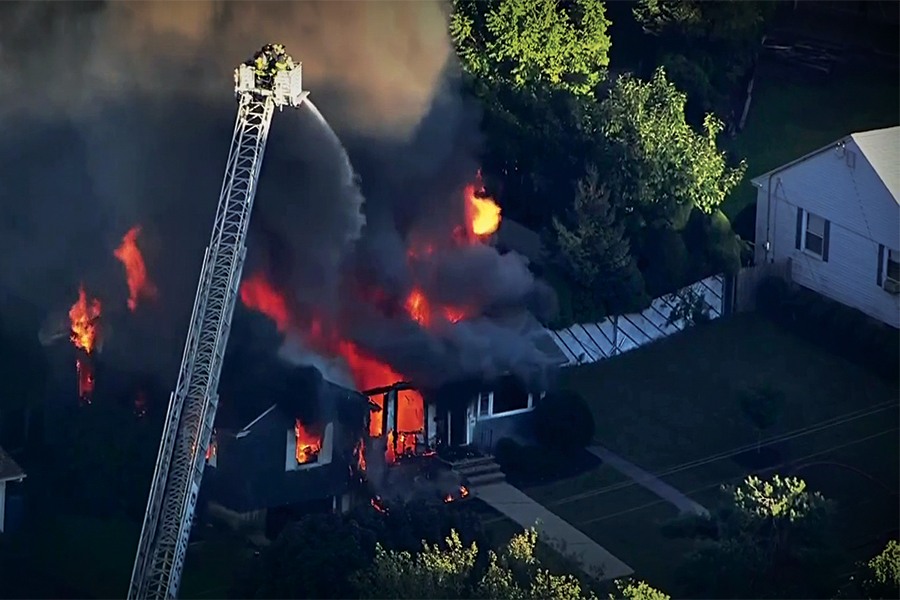
On September 13, 2018, explosions and house-fires rocked South Lawrence in the wake of a gas line failure. / Photo courtesy of WCVB NewsCenter 5

Photo courtesy of WCVB NewsCenter 5
That night, across Massachusetts and the country, people turned on their TVs and watched Andover, North Andover, and Lawrence burn.
Bart Maderios was one of the few who knew exactly what he was looking at. For 42 years, he told NBC Boston in December, he’d managed the regulation of gas pressure in Columbia Gas’s pipelines throughout the Merrimack Valley. In early 2018, Maderios didn’t like what he was seeing. His company had initiated a major restructuring, and layoffs in his own department—from four people to one—seemed reckless. Other decisions made him increasingly concerned for public safety. He announced that he would be retiring at the end of the summer, but before he hung up his safety vest and embroidered shirt for good, he says he left a clear and damning trail of warnings: Underneath the streets of the valley was a catastrophe waiting to happen.
In the years leading up to Columbia’s restructuring, Massachusetts legislators had put more pressure on its public utilities to take responsibility for the state’s ancient gas infrastructure. Gaping holes and cracks in the hundreds of miles of cast-iron pipes, more than a century old, were causing more than $100 million in leaks per year—losses that the utilities routinely passed along to their customers.
According to federal data, even before the Lawrence fiasco, Columbia Gas had reported 11 hazardous-materials incidents since 2010, including two explosions, which is more than any other gas company working in the state over that time. New legislation in 2014 forced the gas companies to replace the old system with new plastic pipes. It was a huge and expensive endeavor. As a subsidiary of a publicly traded company, Columbia Gas would likely incur a large financial hit. To cut costs, Maderios has said, in 2018 Columbia eviscerated its Measures and Regulations Group, which he headed. And according to a report by the National Transportation Safety Board, Columbia Gas had also allegedly ended the practice of having someone from that department monitor pressure while construction was going on. The report also said that the company told its engineers that they didn’t have to have every department sign off on their construction drawings. Save time. Save money. Get the job done.
Leading up to his retirement that summer, Maderios said he had warned Argo and general manager Frank Davis that these shortcuts, implemented so the company could upgrade its outdated infrastructure more quickly and cheaply, were creating serious dangers of their own. He says they ignored him. On September 13, his worst fears came true.
Earlier that afternoon, a team of subcontracted workers finished laying down a new pipeline main at a major intersection in South Lawrence. As per the construction drawings, which had faced only a streamlined approvals process, the flow of gas was redirected to the new line. The NTSB determined that the workers disconnected the abandoned line without knowing it still contained a live pressure sensor.
When the dead pipe’s sensor detected flagging pressure, it called for more gas. The main supply valve responded, automatically opening wider, then wider still, sending more gas into the system until the pipelines feeding South Lawrence—under its homes, businesses, and schools—were over-pressurized.
Columbia’s problems didn’t end there. It took the company a mere half-hour to shut off the problem regulator, but with only three workers driving around the city, it took them three hours and 20 minutes to shut off all 14 pressure regulators that controlled gas flow into South Lawrence. At midnight, the company finally got to work shutting off all of its customers’ meters.
Although Columbia’s response team was understaffed, the company dragged its heels asking for help. At Lawrence’s command center, Rivera says Columbia’s Argo assured him that he would call for mutual aid. The presidents of Eversource and National Grid arrived at the Lawrence command center early Thursday evening, ready and waiting to order their plumbers and gas workers to help shut off the gas meters—all they needed was Columbia to give the order. But that call didn’t go out until 2:52 a.m.
By the next afternoon, Governor Charlie Baker was so fed up with Columbia’s sluggish response that he called a state of emergency, putting Eversource in charge of the disaster. Only then did hundreds of plumbers and pipe workers from Eversource and National Grid descend upon the city, going street by street, house by house, helping to turn off gas lines, shutting down meters. By Sunday at 6:30 a.m., more than 60 hours after the nightmare had begun, the city was finally safe.
The Columbia Gas explosions set off more than 120 fires across the Merrimack Valley and leveled five homes. Some 8,600 meters were affected by the accident. Thousands who were rendered homeless overnight were forced to live in temporary housing for months as they waited for their appliances and boilers to be repaired or replaced. It was almost too much for Lawrence, a city with high rates of poverty and all that comes with it: addiction, health issues, depression, stress, crime, and hopelessness. And then, as Rivera says, to add insult to injury, “your house catches on fire because the gas company blew up the system.”
The fires may be out, but now there is something else in the air: a pervasive anxiety throughout Lawrence, a citywide PTSD. There’s fear of police banging on doors to evacuate the city. There are the recurring memories of grabbing loved ones and a few scant belongings in a panic to flee through the streets of a blacked-out city.
Most of all, there is the fear of gas. Moriarty says he remains inundated with calls from South Lawrence reporting the smell of fumes. “There’s an awful lot of scared people over there,” he says.
In the aftermath, Columbia Gas paid out more than $50 million to restore Lawrence, fielding more than 23,000 claims, but the total price tag may reach $800 million. Much of that will be covered by the company’s insurance. Columbia Gas will also need to replace 45 miles of damaged underground pipes in Lawrence, Andover, and North Andover. To house the thousands of Columbia Gas plumbers, pipeline workers, and carpenters required to rebuild the area, the company chartered a cruise ship—the Grand Celebration—which it anchored in Boston Harbor. The ship was there until December. The company has said it plans to seek a rate hike to cover those costs, something Attorney General Maura Healey, as well as Massachusetts’ U.S. senators, have vowed to block.
The state can fine the utility for pipeline violations, but there are caps. Experts estimate the total state fines may amount to $100 million. For parent company NiSource, a company worth more than $9.5 billion, that’s like a parking ticket.
The company is, in fact, doing fine. As the market closed on September 13, just as the first fires were breaking out, NiSource’s stock price topped off at a years-long high of $28.08. The next day, following news of the tragedy, it dipped a mere 28 cents.
Given the scale of the valley-wide disaster, it’s remarkable that only 21 or so people were hospitalized. But for one group of friends who gathered that afternoon to celebrate a young man’s driver’s license outside 35 Chickering Road, the catastrophe’s toll is overwhelming. The house is no longer there. And the tight-knit group will never be the same.
Omayra Figueroa’s son, Christian, suffered four fractures to his pelvis. His brother, Sergio, sustained damage to his lungs. Their sister, Shakira, who was trapped inside the house, suffered crushing injuries to her pelvis and legs, with bones shattered into multiple pieces. She has already undergone multiple surgeries and it remains unclear if she will ever fully recover. Their friend Leonel Rondon will not. As doctors at Mass General worked to address his injuries, his life slipped away.
The Rondon family is currently preparing to file a wrongful death lawsuit in Essex County Superior Court. And their attorney, Doug Sheff, is certain that he has a case. He knows he’ll have to convince a jury that Columbia behaved in a reckless, willful, or wanton way, and swiftly lists all the things he believes led to this tragedy—the layoffs, the whittling down of critical departments, the questionable construction-review process. It was outrageously cavalier, he says. It was stupid.
Indeed, during its investigation, the National Transportation Safety Board questioned why Columbia Gas, four years earlier, had abandoned the practice of having a field technician onsite at construction jobs to monitor any work that involved depressurizing main lines. It was the same question Maderios has said he’d asked the company for a year. When we asked it, NiSource and Columbia Gas of Massachusetts spokesman Dean Lieberman offered very little. “As a party to the NTSB investigation,” he said, “we are prohibited from discussing the cause of the event or NTSB investigative information related to it until the NTSB has completed its work.”
Under the law, the Rondon family is entitled to capture punitive damages if it prevails in court, which means, unlike the fines, it could result in a decision large enough to make the corporation wince. That’s what the devoutly Catholic Rondons want to happen. Not because they are vindictive, but because they don’t want their son to have died in vain. A favorable decision, Sheff says, “will provide the Rondons with meaning, that they’ve done God’s work.” There is ample evidence, they argue, to believe that this company won’t feel the impact of their son’s death if it’s not on their bottom line. And maybe, just maybe, they hope, it will make Columbia and other companies think twice about putting profits before safety again.


